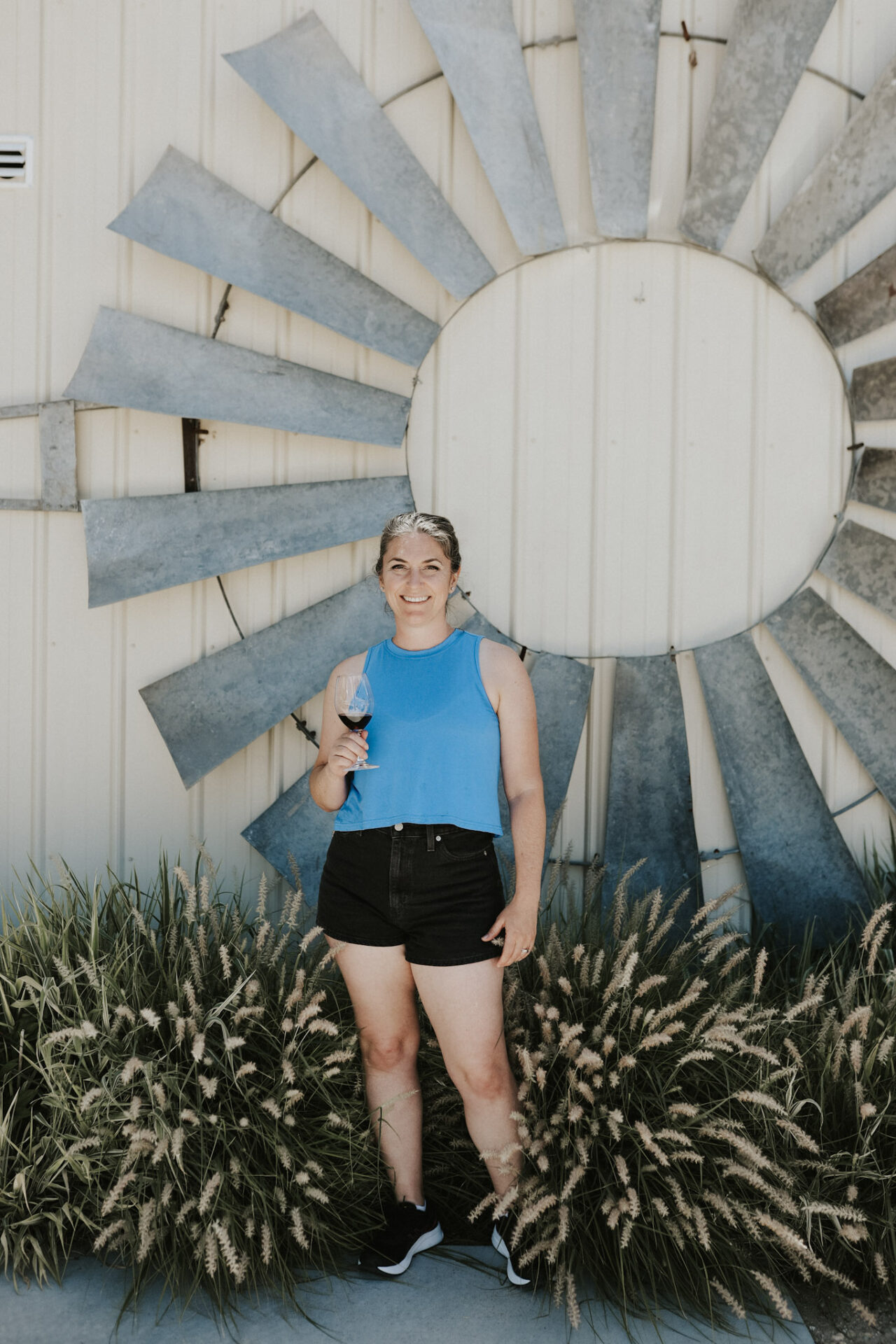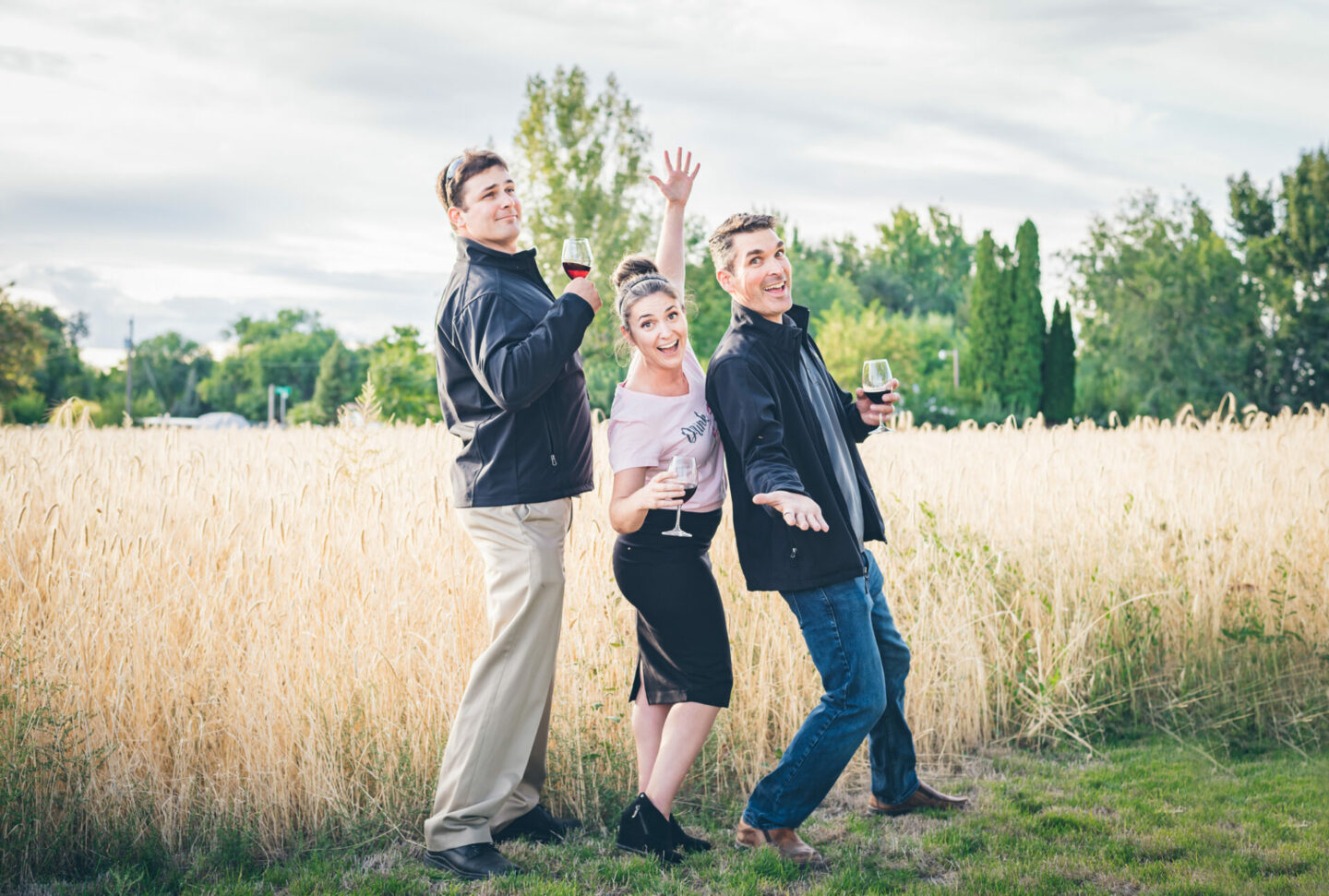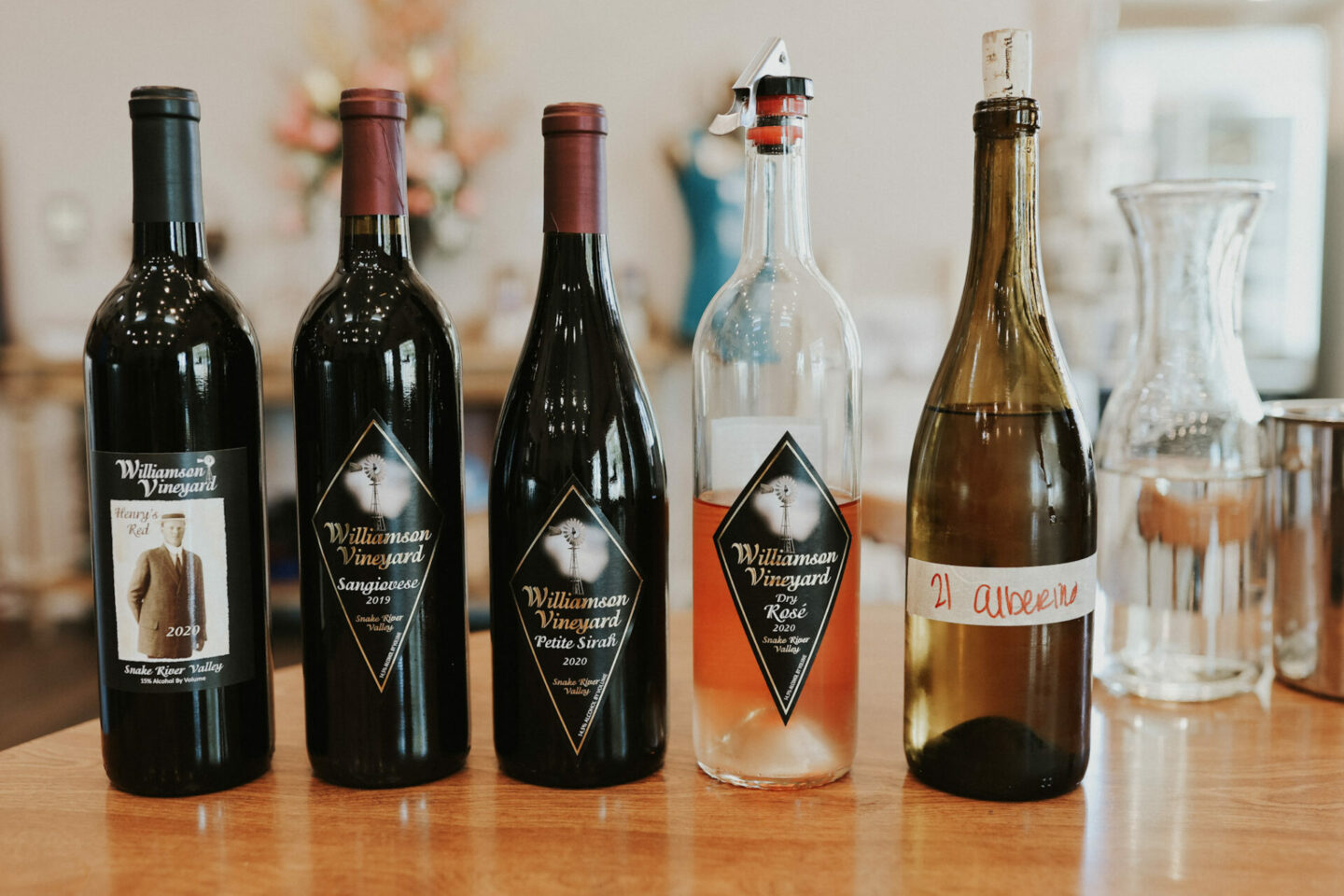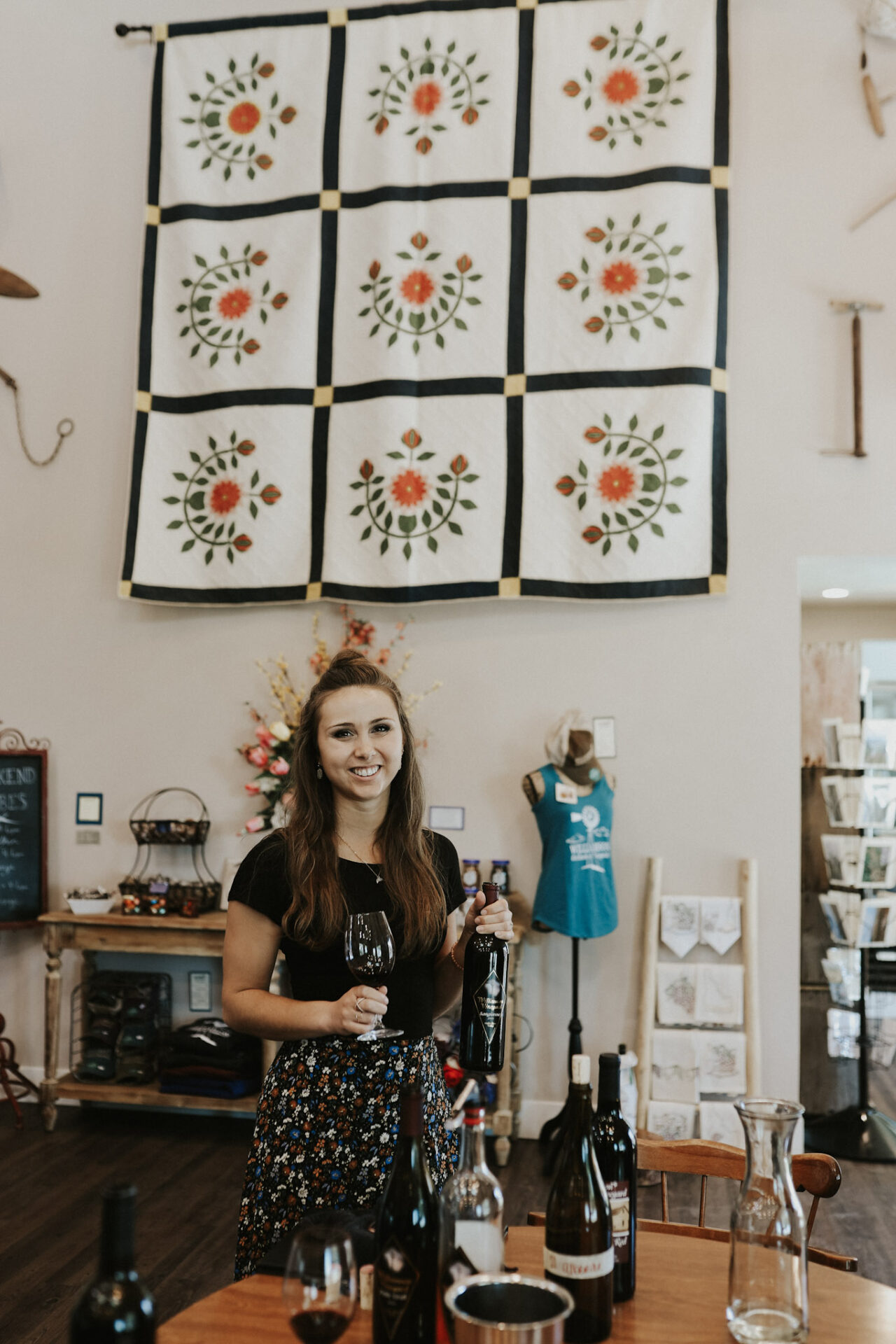
Williamson Orchards and Vineyards, located in the heart of the Sunnyslope Wine Trail, has been family owned and operated for generations. What started off as a family homestead, is now a thriving orchard, well-known grape grower, and award-winning winery.
I sat down with Beverely Williamson to chat about her family legacy and the incredible wines Williamson Orchards & Vineyards are producing today.
As always, this interview is edited for clarity and flow.
>> Related: Best Wineries in and around Boise, Idaho <<

I’d love to hear more about the wines you make – how many are there? What are you most excited about?
I’m going to say it’s 18 different labels now. But we’re probably more proud of the growing side of things. We have about 18 different grapes too, that we grow, for ourselves and through contracts. I want to say it’s a rotating number, but it’s about 10 to 11 different wineries and winemakers that purchase our grapes, which is really nice. When you don’t have to find a use for all of the grapes you produce because grapes are actually surprisingly prolific. We’re really lucky to have so many winemakers willing to work with us and commit to three-year contracts to purchase our grapes. That keeps the lights on during the slow periods in the tasting room and then I get to have fun and dabble with marketing all the grapes and all the wine that way.
How many acres do you own?
The family farm is diverse; in total there are about 360 acres. Of that, we have 68 acres in grapes and vineyards. The rest is either in orchards or other crops.
Family farm? How long has your family been working the land here?
I’m the fourth generation. The business is currently owned and operated by my older brother, Michael Williams, myself, and our cousin Patrick. The three of us inherited it from our parents and have been running the farm since about 2012.
We grew up doing all the things. We all started by working in a packing shed when we were a full-blown fruit distributor with the orchards. Since then, we’ve done everything from working in the field to labeling bottles to shelving cases.
The family homesteaded in 1909. Lillian Williamson Gammon was our direct ancestor and she came from Virginia with her husband George. They just wanted to get out of Virginia and there were some really cool opportunities in Idaho. Are you familiar with the homestead acts?
Only very vaguely…
It was a program that the United States ran to encourage people to move out West. And so they would give away or sell at really reduced rates, property to basically get people to populate the new states. So every state did its own thing.
So in the late 1890s, early 1900s, Idaho, was a very, very young state. And when they were at that time running their version of the program where they had people who would purchase property at a super discounted rate. At that time, the 40-acre parcels were going for $200, which is like well… But that wasn’t anything to sneeze at, either. Because you know, $200 in the early 1900s is a lot of money too.
There were some stipulations — Idaho required that you would be leasing the land for the first 15 years and you had to keep the land in agriculture, you had to keep it in the family, meaning you couldn’t subdivide it and sell it. You had to keep it, keep it in agriculture, keep it in the family, and you had to do so 15 years. And if you follow through with that, then you got the deed, you got the title to the ground. And so Lily and George heard about this and like, yeah, that’s what we’re gonna go. It’s a good deal.

That’s incredible. So when it did become a winery? I assume they didn’t set out to grow grapes here!
Yes, so that’s where we originated from. Now we are a century farm. We got that in 2009 and had quite a big celebration.
Since then, we’ve obviously gone in a different direction from what Lily and George did with a farm. We started as a full-blown homestead where they had a little bit of everything.
There is a long history that goes with the farm that involves a lot of other characters too. And I won’t go into super detail because it gets confusing…. But I will say that Lillian had a younger brother, Henry, who came out and essentially saved the farm and he was pretty important. And then my direct descendant would be their nephew. Another brother’s son, Jacqueline’s, and he’s my grandfather, and he came out from Virginia after World War Two, and he is the one who kind of got us to this point where we’re at now.
I can we’ll get into that as we talk some more, but first I wanted to tell you what you have in your glass.
Yes, please! What is this?
The Albarino you have in your glass is one of our most exciting wines slash grape varietals that we have right now. We planted these grapes only five years ago and we’ve had three vintages off of it already, which is unheard of. I don’t know how Mike and Patrick did that. Mike is my older brother and Patrick’s my cousin and they are our vineyard guys. I just think they’re really special somehow.
In every vintage we have produced so far, this wine has been bringing in pretty big awards, like double golds and best shows. And we did it again just recently with the Idaho wine competition.
So we’re really excited. When we planted the grapes, we were specifically looking for a dry white. Prior to this, we had Vigionier and Riesling, and those were our only two white grapes. And we needed to have something in our profile that was a distinctively crisp, dry white. Our Rieslings are off-dry and Viognier can seem sweet because it’s fruit-forward, so we needed something else. So now we brought in this Albarino to help us out with having a more crispy option for people.
It’s delicious!
Could you speak a little about being a woman in wine? I’d love to hear your perspective, especially here in Idaho where there is such a high percentage of women in the industry.
I’m very, very blessed to work in the field where there are definitely fewer issues with being a female in my industry than in other industries. And I’ve lucked out with a family that really promotes like, you can do anything that they do, basically, because I had to. So yes, we’re, I was really unique and very cool in that regard.
You mentioned earlier you were looking for more dry white wines. Do you feel like your consumer’s tastes are changing from sweet to dry?
Yes, very much. So when we first got started, I would say it was kind of before Idaho had our big population boom. And a lot of Idahoans at that time were not really very educated on wine; they just didn’t know what they liked yet. And so they were learning along with us.
We were in a fairly rural area. There were a lot of beer drinkers, and whiskey drinkers and so they could understand sweetened, that’s where they got started. And then we started to see their palates expand along with the wine industry. And then we see a lot of people move into the state of Idaho from other places. And they were definitely used to the quality of wine coming out of California and Washington and New York, where the bar was a little bit higher, as far as the drier, more tannic, more savory elements that can be found in wine.
Since then, we definitely have adjusted our style on our whites. I wouldn’t say we’ve adjusted our reds that much– we have always been this way with them.
We’re a bunch of orchard kids, right? We grew up playing in trees, and I worked in our family’s fruit stand from a young age. I was working with my family selling fruit, talking to people about fruit. And so we just naturally tend towards a big fruit representation in the flavors. We want to taste what we grew. And so I do get concerned that some people hear fruit and they think sweet, that’s not necessarily the case. I think it’s you can taste a lot of different elements of things that the grape might be similar to. So when we have our Petite Syrah, you know, I pick up a lot of mountain berries like BlackBerry. But then you also get the tannin, which brings in things like minerality, and oak expression, that kind of thing.
Suggested: Best Wineries Near Boise, Idaho
Check out this guide to the best wineries in and around Boise, Idaho — perfect for your next wine tasting adventure!
>> Read the post here <<
How would you describe Idaho wine in general?
I think you’re going to find a lot of Idaho wines are very big and fruit-forward, which is very much linked to our style. But you’re also going to see some minerality coming out of the state of Idaho, specifically in this Sunnyslope Valley region right here and anybody along the Snake River. You’re gonna see a lot of that and it’s it has a lot to do with our geological history and soil.
Thank you so much for your time! This was incredible and I really enjoyed your wines. Some of my favorites in Idaho so far!
Of course! Thank you!


I love wine, your photos are so beautiful, my dream is to own my own wine farm